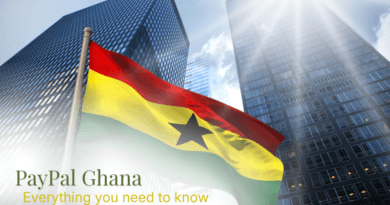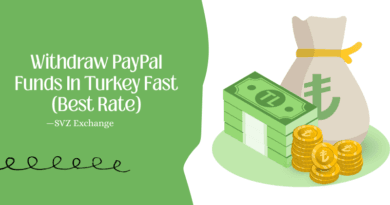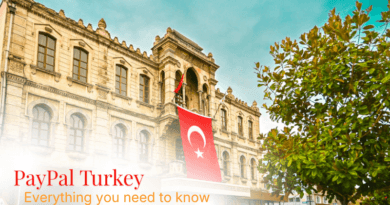How to Withdraw Money from PayPal In Nigeria at the Best Rate (Ultimate Guide)
Managing to be able to receive payment through PayPal (In Nigeria) might seem like you have gotten it all — until it’s time to withdraw. That’s where most people get stuck.
If you’ve ever tried to move your PayPal funds out, you already know the struggle: lack of the option to link the local bank, failure while trying to link a foreign bank account, and withdrawal failures.
The truth is, PayPal still doesn’t give Nigerians the full experience other countries enjoy. But don’t worry — this guide breaks down everything you need to know about withdrawing your PayPal funds safely and at the best rate possible.
We’ll cover:
- Why It’s Not Easy to Withdraw PayPal Funds in Nigeria — Why PayPal limits Nigerian accounts and what really causes those withdrawal barriers.
- PayPal Withdrawal History since the Start In Nigeria — A quick look at how PayPal’s operations in Nigeria have changed over time.
- #1 Way Of Withdrawing from PayPal In Nigeria (SVZ Exchange) — How SVZ Exchange helps you cash out your PayPal funds safely and instantly.
- Other Ways to Cash Out PayPal Funds — Alternative withdrawal options and how they work.
- Linked Bank or Card — How to use a supported foreign PayPal account to transfer funds directly.
- Best Practices for Withdrawal of PayPal Money in Nigeria (Stay Safe) — Important safety rules and smart steps to keep your funds protected.
- Conclusion — Final thoughts on the best withdrawal path for Nigerians.
- FAQs — Clear answers to the most common questions about withdrawing PayPal money in Nigeria.
By the end of this post, you’ll know exactly how to move your PayPal funds into Naira — quickly, safely, and at a fair rate.

Why Is It Not Easy to Withdraw PayPal Funds in Nigeria?
Withdrawing PayPal funds in Nigeria isn’t as easy as it sounds. Here are the main reasons why:
- PayPal doesn’t fully support Nigeria yet
The Nigerian version of PayPal is restricted — you can only send money, not receive it. This limitation makes it difficult for freelancers, business owners, and individuals who get paid from outside the country. - No direct withdrawal option to local banks
You can’t just link your Nigerian bank account and click “withdraw.” PayPal doesn’t support withdrawals to most local banks, so there’s no straightforward path to cashing out in Naira. - Verification and compatibility issues
Even when people try linking cards or foreign accounts, PayPal often rejects them. Only specific foreign banks and cards are accepted, and setting those up isn’t easy for the average user. - Account restrictions and sudden holds
PayPal sometimes flags Nigerian-linked accounts as high risk. When that happens, funds may be held for up to 21 days or longer before you can touch them — especially if you’re receiving payments regularly. - Currency conversion and high fees
PayPal charges extra for conversions and cross-border transactions. By the time you finally access your money, a noticeable amount has already been deducted as fees. - Limited customer support for Nigerian users
If your account gets restricted or a transaction is placed on hold, resolving it can be frustrating. PayPal’s support system doesn’t have a clear, direct channel for Nigerian-based users.
In short, it’s not that PayPal doesn’t “work” in Nigeria, it just doesn’t work the way we need it to.
PayPal Withdrawal History since the Start In Nigeria
PayPal entered Nigeria in 2014 with send-only access, which meant people could pay online but could not receive or withdraw to Nigerian banks. Banks like UBA and FirstBank helped by issuing cards that worked well for online payments, but this did not unlock withdrawals (e.g., UBA confirmed its cards were accepted on PayPal back in 2014). Between 2014 and 2019, many freelancers used a Payoneer workaround by linking Payoneer’s US receiving details inside PayPal and then moving funds to local banks. It worked for some time, then rules tightened and the path was largely closed. From 2017, virtual USD cards such as Barter and later Chipper made it easier to fund PayPal for subscriptions and shopping, but they never enabled withdrawals, and over time more merchants began declining those cards. In 2021, a practical business path arrived through payment gateways: Flutterwave added a “Pay with PayPal” option at checkout, letting Nigerian merchants receive PayPal-funded payments and settle locally without converting a Nigerian PayPal into a receive account. Separately, withdrawals through FNB in South Africa have long been available for users who are truly set up in SA, but that route does not convert Nigerian accounts.
Today, the simple truth remains: Nigerian PayPal accounts are still send-only, so direct withdrawal to a Nigerian bank is unavailable. If you need to collect customer payments that originate from PayPal, use a gateway that supports PayPal at checkout and then settle to your local account. The differences people notice in “rates” mostly come from stacked fees across the journey.
What used to work but faded:
- Linking Payoneer receiving accounts to withdraw from PayPal, later restricted.
- Using virtual USD cards for spending; useful for payments, not for cashing out.
What reliably works now (for businesses):
- Accept PayPal-funded payments via a gateway like Flutterwave, then settle locally.
- If legally based in South Africa, use the official FNB withdrawal flow for SA accounts.
#1 Way Of Withdrawing from PayPal In Nigeria (SVZ Exchange)
Before diving into how to use it, let’s first explain what a PayPal exchanger actually is.
A PayPal exchanger is a middle service that helps you convert your PayPal funds into local currency. Since PayPal doesn’t allow direct withdrawal to Nigerian banks, exchangers act as the bridge between your PayPal balance and your Naira account.
Here’s how it generally works: you send your PayPal funds to the exchanger’s verified PayPal account. Once they receive it, they transfer the Naira equivalent to your bank account based on the agreed rate. It’s a simple send-and-receive system — fast, direct, and practical for Nigerians who can’t withdraw through PayPal itself.
What SVZ Exchange Does
SVZ Exchange is our PayPal fund exchange service created to make this process easy, transparent, and safe for everyone in Nigeria. We help freelancers, business owners, and individuals withdraw PayPal funds at fair rates without long delays or hidden charges.
Once your payment is confirmed, the Naira value is sent directly to your local bank account — usually within minutes. For large transactions, we also support escrow deals to ensure both sides are protected.
Aside from helping you withdraw your PayPal balance, SVZExchange also offers the following services:
1. Receive payments on your behalf
If you don’t have an active account, we can receive your payment directly from your workplace or clients — whether they pay through PayPal or any other platform you can’t access.
We’ll use our verified account to receive the funds, then credit you Naira equivalent.
2. Fund your PayPal balance
We don’t just help you withdraw, we also make it easy to fund your PayPal balance whenever you need it.
Simply send us the Naira equivalent, and we’ll load your PayPal account with the corresponding amount.
3. Make payments for you
If you need to make a payment but don’t have an active PayPal account, we can handle that for you.
Just send us the Naira equivalent and the transaction details, and we’ll complete the payment on your behalf.
4. Help you set up verified accounts
We guide you through creating a verified PayPal account that can send and receive payments in Nigeria or anywhere else.
Our setup guide includes the key to successfully linking a foreign bank to PayPal.
We can also create the account for you using your full identity with your full cooperation… if you are going with our PayPal set-up service.
Other Ways to Cash Out PayPal Funds
Aside from using an exchanger, there are still other ways to access or use your PayPal balance.
The most common one is linking a foreign bank or card that PayPal supports.
Let’s look at how that works below.
Linked Bank or Card
If you manage to set up a PayPal account that supports foreign bank linking, and you’re able to operate it from a supported country or region, then yes — you can use the “Link to Bank” option on PayPal.
You’ll just need to provide your bank details, and PayPal will connect it. From there, you’ll have direct access to your money.
However, unlike using exchanges such as SVZ Exchange, this process can be tricky.
Even if your account is created in a supported region, you might still run into issues — from PayPal rejecting your bank, to transfers bouncing back to your PayPal balance, and other similar problems.
At SVZExchange, we also provide a clear guideline on how to set up a verified PayPal account — one that can send, receive, and connect to your bank account. Compared to withdrawing via a linked bank/card, using an exchanger saves you the waiting and failed transactions. You get your Naira equivalent instantly, without dealing with bank or card processing delays.
Best Practices for Withdrawal of PayPal Money in Nigeria (Stay Safe)
Withdrawing PayPal funds in Nigeria requires caution. Below are some safety practices to protect your money and to have a good withdrawal experience.
- Don’t send huge amounts into your account if it can’t carry it yet
Always know your account’s strength. Sending a large amount at once may trigger PayPal’s security system, leading to a 21-day hold or even longer. It’s better to build transaction history gradually before sending high amounts. - Use exchangers with online presence and real reviews
Before choosing any PayPal exchanger, check their website, social media pages, and customer feedback. An exchanger without an online footprint is risky. Using one with visible reviews helps you confirm their legitimacy. - Test with smaller amounts first
Never start big. Send a small amount first to test how fast and reliable the exchanger is. Once confirmed, you can then proceed with larger transactions confidently. - Use escrow for huge transactions (SVZ Exchange supports this)
When dealing with high-value exchanges, use escrow services to ensure both sides are protected. This method secures your funds until the transaction is fully completed. SVZ Exchange offers this option to keep big deals completely safe and transparent.
Conclusion
The topic — “how to withdraw PayPal funds in Nigeria” was only possible because people do use supported regions to make their accounts.
If not, what will be the essence of that question considering PayPal for Nigeria already doesn’t support receiving money.
When you can’t receive money, then you can’t withdraw. Simple!
But for those who found their ways out through either a partial-legal or 100%-legal way, that’s a different point for them.
By using PayPal vendors like SVZ Exchange, they can easily suck their balance out from PayPal and spend it on that thing they want.
They can also use other ways like connecting a bank or card to PayPal that supports withdrawal.
FAQs
How to withdraw PayPal funds without involving an exchanger?
This is one of the most common questions we get — and it makes sense. Most users want a way to receive PayPal payments and get their money directly in Naira, without going through multiple steps or facing double charges.
At SVZ Exchange, we offer a solution that comes very close to this:
It’s called Receive For You, also known as the Pickup Service.
Here’s how it works:
- You plug our PayPal email into the platform or client that wants to pay you.
- They make the payment directly to our verified PayPal account.
- Once we receive it, we send you the net Naira equivalent — no need for you to handle the PayPal side at all.
This method eliminates the usual double charges that come when someone first receives the PayPal payment and then sends it again to an exchanger.
For example, instead of losing $10 on a $100 transaction due to multiple $4+ fees, the ‘Receive For You’ service handles everything in one clean step.
We also offer some powerful bonus features with this method:
- 24-Hour Settle: You allow your money to move through the PayPal system until it drops in our Nigerian account, then we pass the full Naira value to you. This usually gives you a better rate, often up to ₦50 more per dollar — because we’re not risking or committing our own funds as float.
- We bear the risk: Whether you’re sending from your PayPal account or a third-party company is paying you through us, once the payment is sent, you’re covered. Even if our PayPal account becomes restricted or limited, you’ll still get your NGN payout immediately.
This is the closest you’ll get to withdrawing PayPal funds without using a typical exchanger. It’s direct, transparent, and handled entirely by us — so you never have to touch PayPal yourself.
Is the rate of PayPal balance the same as fiat currency?
Not really. Even though they might look equal at first glance, there’s one main thing that separates them. One type, which is fiat currency, is already redeemed and fully prepared. The other, your PayPal balance, is still in a form you can’t completely use for every purpose.
PayPal USD, PayPal Euro, PayPal GBP — all of them come with fees when you try to convert them to fiat currency (and then to Naira).
Fiat currency is already in that complete state, ready to use anytime. PayPal balances are not always that ready.
What actually separates the rate between the two are the fees.
PayPal charges a transfer fee of up to 3.5%. The bank also charges a deposit fee. So when you withdraw money from PayPal, you might lose between 5% and 10% of your USD, Euro, or Pounds.
Even after that, when those foreign balances reach your bank account, you still need to convert them to Naira, and that comes with conversion fees starting at 1%.
When you consider all these factors, it becomes clear why a PayPal balance usually has a lower rate than fiat currency.
Is PayPal available for Nigerians in 2026?
PayPal is not fully available in Nigeria as of 2026.
PayPal has reportedly announced plans to partner with companies in Nigeria to expand its services in the country. This move is expected to allow Nigerian users to receive funds, which has long been a major limitation.
However, as of the time of updating this article, this new feature and upgrade have not yet been released. As a result, Nigeria still suffers the challenge of receiving funds through PayPal.
Can I withdraw from PayPal to a Nigerian bank account?
You cannot directly withdraw from PayPal to a Nigerian bank account.
What works is using a linked foreign bank account or card, or an exchanger. You withdraw in foreign currency, then convert the funds to Naira.
What’s the best PayPal Vendor in Nigeria?
From our research and customer feedback, SVZ Exchange stands out as one of the most trusted PayPal exchangers in Nigeria. We offer clear rates, fast payouts, and optional escrow protection for large deals.


